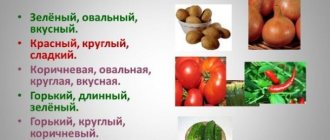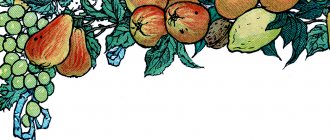Fruit or Vegetable: What's the Difference?
It is a common misconception to believe that vegetables differ from fruits in that they grow on different plants: herbaceous or tree-like. Biologists have a different opinion on this matter, which clearly explains the difference between these groups.
Fruits are the fruits of plants that appear after the flowers fade and the ovary forms. Their main feature is that they have seeds that can differ in density or size. In addition, a shell can form around the seeds: hard (shell) or soft (pulp). Following this principle, many plant fruits that we usually classify as vegetables are actually fruits. So, for example, every botanist will say that cucumbers, tomatoes, pumpkins, eggplants are fruits, since they have seeds.
Vegetables include parts of a plant that are suitable for consumption. These can be tubers, soft stems, leaves or inflorescences, that is, those parts of plants that are not associated with reproduction.
So, to determine the type of fruit, you need to follow a simple rule: if the fruit has seeds, then this is a fruit, and if not, then it is a vegetable. The benefits of the latter are invaluable for the body, because in addition to the high content of valuable fiber, vegetables also contain protein and a whole range of essential microelements.
The benefits of fresh vegetables for the body
Plant food is necessary for normal human life. It is an indispensable source:
- fiber, which cleanses the intestines, stimulating peristalsis, which ensures normal digestion;
- vegetable fats that lower cholesterol and promote active metabolism;
- vitamins of groups A, B, C, which are necessary for most processes occurring in the body;
- minerals (potassium, calcium, magnesium, phosphorus and others), they are the ones who trigger important metabolic processes;
- antioxidants that cleanse the body of various toxins and radionuclides, and at the same time prevent aging;
- essential oils contained in some vegetables (for example, garlic), which have bactericidal properties.
However, it should be remembered that the composition of vegetables is greatly devalued by heat treatment , which destroys most beneficial enzymes, such as enzymes . These enzymes ensure easy digestion of food, allowing you to save internal resources. As a result, energy is saved, which is spent on self-cleansing of the body.
Another undoubted benefit of raw vegetables is the alkaline reaction, which allows you to neutralize the acidic environment that promotes the growth of bacteria and fungi. Regular consumption of vegetables in their natural form helps restore the acid-base balance, the basis of all vital functions of the body.
To saturate your body with useful substances, your diet should consist of a variety of vegetables, the composition of which allows you to properly balance your diet. We recommend including in your diet:
- carrot;
- beets;
- pumpkin;
- turnip;
- cabbage;
- celery;
- horseradish;
- garlic;
- ginger;
- radish;
- radish.
The composition of these vegetables is distinguished by a large number of vitamins and minerals that have a beneficial effect on the health of the body.
Carrot
This vegetable is a valuable source of beta-carotene, a precursor of vitamin A, from which the vitamin is synthesized in the body. In addition, fresh carrots contain a whole range of useful substances, namely:
- B vitamins (B1, B2, B5, B6, B9, B12);
- vitamins D, C, E;
- macroelements (chlorine, magnesium, sodium, potassium);
- trace elements (selenium, chromium, cobalt, copper, fluorine, manganese, iodine).
This rich composition has a positive effect on the cardiovascular system, regulates water-salt balance, and strengthens bone tissue.
At the same time, carrots have a pleasant taste, which is best revealed in its raw form. It is suitable both for a nutritious snack on its own and as an ingredient in a vegetable salad. Regular consumption of juicy carrots will help maintain youth and strengthen the immune system.
More detailed information about the benefits of carrots is described in the ARTICLE .
Beet
This root crop is the leader in mineral content among vegetable crops. Beets are rich in iron, which is necessary to prevent anemia. The vegetable also contains a large amount of zinc, which increases the duration of insulin action. That's why it is recommended for diabetes. At the same time, the calorie content of a raw vegetable is only 40 kcal, which allows it to be included in dietary dishes.
The root vegetable is known for its cleansing properties. In its raw form, beets effectively fight radioactive particles, toxins and poisons, removing them from the body. It is also used as a prophylactic against:
- liver dysfunction;
- disruptions in the gastrointestinal tract;
- changes in blood pressure;
- osteoporosis;
- atherosclerosis.
In addition, there is a scientific conclusion that the pigment that colors the vegetable burgundy prevents the growth of malignant cells, stopping the development of oncology.
More detailed information about the benefits of beets is described in the ARTICLE .
Pumpkin
Not only healthy, but also a very filling vegetable due to its high protein content, which allows it to be used as a complete lunch.
In its composition, pumpkin is close to carrots, with which it has the same orange pigment. The large vegetable is also rich in B vitamins, vitamins A, C, E, D, PP, K, and the rather rare vitamin T.
Pumpkin is an invaluable assistant for the proper functioning of the kidneys and liver. The compounds contained in the vegetable help dissolve stones formed in these organs, removing them along with other waste and toxins. It also has a positive effect on the genitourinary system, promoting the removal of excess fluid, which is useful for edema.
Cabbage
Cabbage is considered one of the most ancient crops that existed before our era in North Africa. The cultivation of healthy vegetables was practiced in ancient Greece, from where it began its victorious march across Europe. Familiar with valuable culture in China and Korea.
Cabbage has an impressive list of useful elements:
- potassium salts;
- phosphorus salts;
- manganese;
- calcium;
- copper;
- iodine;
- magnesium;
- iron;
- phytoncides (natural antibiotics);
- lactose;
- vitamins A, B1, B6, P, K.
In addition, the vegetable contains 16 free amino acids, including the most important for the body - lysine, histidine, methionine, tyrosine.
Cabbage, rich in fiber, is indispensable for the prevention and treatment of diseases of the gastrointestinal tract. The vegetable also contains rare vitamin U, which protects the gastrointestinal tract from ulcers. And cauliflower helps even with advanced forms of gastritis. Its regular use lowers cholesterol levels and strengthens the walls of blood vessels.
More detailed information about the benefits of cabbage is described in the ARTICLE .
Turnip
This healthy vegetable was undeservedly forgotten for some time. But in Ancient Rus' it was considered a staple food because of its availability, nutritional value and beneficial effect on the entire body.
With the expansion of information resources about the benefits of vegetables, turnips are beginning to regain their former positions. Possessing a unique composition, it helps not only to provide organs with the necessary elements, but also effectively fights diseases.
- Regular consumption of turnips reduces the risk of joint damage and the development of osteoporosis, since the vegetable is a source of calcium and potassium;
- Turnips contain powerful enzymes that help the liver remove waste and toxins, as well as fight carcinogens entering the blood;
- The root vegetable and its tops contain antioxidants that protect blood vessels from the formation of cholesterol plaques;
- Adding raw turnips to your diet will help prevent cancer in the lungs, colon and rectum.
Turnip is a real treasure for girls who take care of the condition of their skin and hair. The vitamins and minerals contained in the vegetable keep hair shiny and silky, stimulating its natural growth. And a large amount of antioxidants slows down premature skin aging, prevents the appearance of wrinkles and pigmentation.
Celery
Celery is a valuable vegetable that provides the body with vitamins A, C, B1, B2, and a number of minerals, such as:
- Magnesium;
- Iron;
- Calcium;
- Phosphorus;
- Iodine.
Celery is known for its effect on the nervous system, which normalizes sleep, improves performance and overall tone of the body.
In addition, the vegetable has a negative calorie content - when digested, the body spends less energy than it receives. This makes it indispensable for people who want to lose weight.
In order to get maximum beneficial properties, it is recommended to consume celery as freshly squeezed juice. Its vitamin and mineral composition activates metabolic processes, helping to cleanse and rejuvenate the skin. And for medicinal purposes, celery juice helps to gently remove sand from the kidneys.
Horseradish
Horseradish leaves are as beneficial for health as its root. They are filled with phytoncides and essential oils, which act on the body as a natural antibiotic, protecting the immune system. They are recommended to be consumed as vitamin salads.
Horseradish root contains fiber, B vitamins, vitamin C, E, PP and a whole range of minerals:
- iron;
- phosphorus;
- magnesium;
- Sodium;
- sulfur;
- calcium.
This composition improves appetite and stimulates the stomach, which makes it indispensable for people suffering from gastritis.
Garlic
Just 4 g of garlic per day allows you to saturate the body with almost all the necessary vitamins and minerals, because it contains more than four hundred different components. The main ones are antioxidants that help fight infectious diseases.
- Garlic produces active substances that destroy pathogenic bacteria. It has been scientifically proven that the vegetable is effective against diphtheria bacilli, streptococci and staphylococci;
- Allicin contained in garlic has such a powerful bactericidal property that even eating a small amount of the vegetable can cause a serious blow to bacteria and fungi;
- Recent scientific studies have shown that phytoncides contained in garlic reduce the risk of developing cancer;
- In folk medicine, garlic is used against colds. Moreover, it begins to act in the oral cavity, destroying carriers of viral infections. It is also indispensable for fighting intestinal parasites, as a result of which the skin is cleansed.
Garlic has a pronounced taste and aroma. It is great for adding to salads, enhancing their taste. Garlic can be used as an ingredient in formulations to strengthen the immune system.
Ginger
Among all the spices, ginger root ranks first in terms of the amount of micro-, macroelements and vitamins. This aromatic plant with a unique taste is grown all over the world.
Ginger is a natural cleanser for the body. It dissolves toxic compounds that settle on the walls of blood vessels, accumulate in the liver and kidneys, removing them naturally. This makes it indispensable in the fight against various diseases that arise as a result of slagging in the body.
Ginger, rich in biologically active components, effectively fights bacteria and fungi. Penetrating directly into the cells, it affects the lesion due to its anti-inflammatory properties. Therefore, it is recommended for viral and colds, as well as for general strengthening of the immune system.
Medicines are made from this valuable product. With their help, blood vessels are cleansed of cholesterol, the liver of poisons, and the intestines of toxins. Such systematic cleansing helps prevent the development of cancer cells and improve the health of all internal systems.
To preserve beneficial elements, it is recommended to consume ginger root raw, without heat treatment. Therefore, it is better to replace the popular ginger tea with chewing a small piece of fresh root, which will improve the condition of your teeth and gums.
The properties of ginger will be appreciated primarily by those who suffer from a weak digestive system. It is indispensable in the fight against diarrhea, colic, gas and nausea. Ginger also successfully copes with the latter during toxicosis in pregnant women.
Radish
The healing properties of radish were well known to ancient people. Different nations valued their “own” varieties of root vegetables: black, white, green and red radish. Thus, the Greeks considered this vegetable the main product on the table, and the ancient Egyptians used radish as the main source of strength and endurance.
The unique composition of the vegetable crop allows it to replenish the necessary supply of vitamins in the autumn-winter period, when not many vegetables are available. The juicy root vegetable contains:
- essential oils;
- minerals (sodium, phosphorus, magnesium, potassium);
- amino acids;
- fiber;
- phytoncides;
- vitamins of group B, E, C.
The main benefit of radish is its bactericidal and anti-inflammatory effect, which maintains health by increasing immunity.
Radish
Juicy and crispy radishes are a storehouse of minerals and vitamins. Allows you to start strengthening your body in the spring. The taste of radishes has a slight bitterness, which is due to the presence of essential oils that have a positive effect on the nervous system.
Juicy and tasty radishes are so rich in vitamins that 100 g of the product will provide the daily norm of useful elements for the body.
The vegetable is quite nutritious and surpasses tomatoes and zucchini in terms of protein. The composition includes easily digestible carbohydrates, which makes the menu containing radishes balanced. At the same time, the calorie content of the product is only 14-16 kcal per 100 g. The benefits of vegetables, especially fresh ones, are undoubted. Regular consumption of vegetables guarantees good health and excellent functioning of all body systems.
Include the above raw vegetables in your diet and stay healthy!




